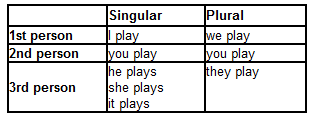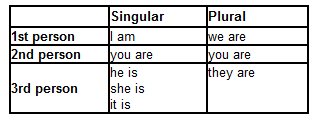Explain Subject verb Agreement
A common mistake
It is very common for student writers to make mistakes when trying to match the subject of a sentence with the proper verb. Professional writers also make these mistakes sometimes, so you should always be on the lookout for the problem.
There are certain forms of verbs that work with certain types of subjects. When you use the correct forms together, we say you have subject-verb agreement.
Subject-verb agreement is fairly simple to achieve when there is only one subject in a sentence, but it becomes a little trickier when you have more than one noun in the subject, and the two (or more) nouns work together as the subject of the sentence. This situation is called a compound subject.
Let’s look at the simpler case first.
Single subjects
When you have a single subject, the verb form depends on the point of view of the sentence--whether the speaker is talking about himself or herself (first person), to another person (second person), or about another person (third person).
Notice how these match with the subjective pronouns. We can use the subjective pronouns to see the pattern.

Most regular verbs follow the pattern of adding an "s" to the end of verbs that go with third person singular subjects. Irregular verbs have different forms.
"Be": a very common, very irregular verb
One of the most irregular verbs in English is the verb "be."

Compound subjects with "and," "or," and "nor"
Compound subjects are created when two or more nouns work together to be the subject of the sentence. They take singular or plural verbs, depending on how they are joined:
1. Compound subjects joined by "and" are treated as plural because the parties are working together and could be replaced by a plural pronoun.
Example
Susan B. Anthony and Elizabeth Cady Stanton are well known for their work to achieve the vote for women.
2. Compound subjects created by two singular nouns joined by "or" or "nor" are working independently on the verb; therefore, they are used with singular verb forms.
Example
Neither Susan B. Anthony nor Elizabeth Cady Stanton was alive in 1920 when women’s right to vote was created by an amendment to the constitution.
3. Compound subjects created by a singular and plural noun joined by "or" or "nor" require the verb form which agrees with the noun nearer to the verb.
Examples
Neither my friends nor I am aware of how much they sacrificed.
Neither my mother nor my friends are aware of how much they sacrificed.